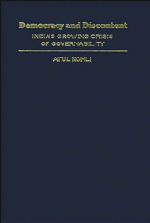Book contents
- Frontmatter
- Contents
- List of tables and figures
- Preface and acknowledgments
- PART I INTRODUCTION
- PART II THE GROWING PROBLEMS OF GOVERNING THE PERIPHERY: POLITICS IN THE DISTRICTS
- PART III ORDER AND BREAKDOWN IN THE STATES
- PART IV CENTRALIZATION AND POWERLESSNESS AT THE CENTER
- PART V FINAL INFERENCES
- 13 Political change in a democratic developing country
- Bibliography
- Index
13 - Political change in a democratic developing country
Published online by Cambridge University Press: 05 June 2012
- Frontmatter
- Contents
- List of tables and figures
- Preface and acknowledgments
- PART I INTRODUCTION
- PART II THE GROWING PROBLEMS OF GOVERNING THE PERIPHERY: POLITICS IN THE DISTRICTS
- PART III ORDER AND BREAKDOWN IN THE STATES
- PART IV CENTRALIZATION AND POWERLESSNESS AT THE CENTER
- PART V FINAL INFERENCES
- 13 Political change in a democratic developing country
- Bibliography
- Index
Summary
In this study I have sought to describe and to explain India's growing crisis of governability. Important political institutions in India have been weakened, and power conflicts have multiplied. The result is that national leaders find it increasingly difficult to put together durable coalitions, to undertake major policy initiatives, and to settle political conflicts without violence. Although the explanation developed here for India's growing turmoil is multicausal, political variables are emphasized. Empirical materials suggest that India's political structures and the choices made by its national leaders have played central roles in molding political changes in India. With that as a general theme, this concluding discussion summarizes the empirical materials, reviews the analytical argument, and attempts to tease out some comparative implications of this study.
THE EMPIRICAL STUDY
It is important to begin this summary by restating the sense in which the terms “crisis” and “governability” are used in this study. The topic of Indian government tends to attract doomsayers. Therefore, it is especially important to reiterate that this characterization of contemporary Indian politics as being in crisis does not predict imminent breakdown of the democratic political order. Rather, the word “crisis” is used to draw attention to certain tendencies toward steady deterioration within the Indian polity. The analysis developed here suggests that the “system” in India can continue to function but that if it does so without major changes, its level of performance will remain quite low and will probably decline even further.
- Type
- Chapter
- Information
- Democracy and DiscontentIndia's Growing Crisis of Governability, pp. 383 - 404Publisher: Cambridge University PressPrint publication year: 1991



